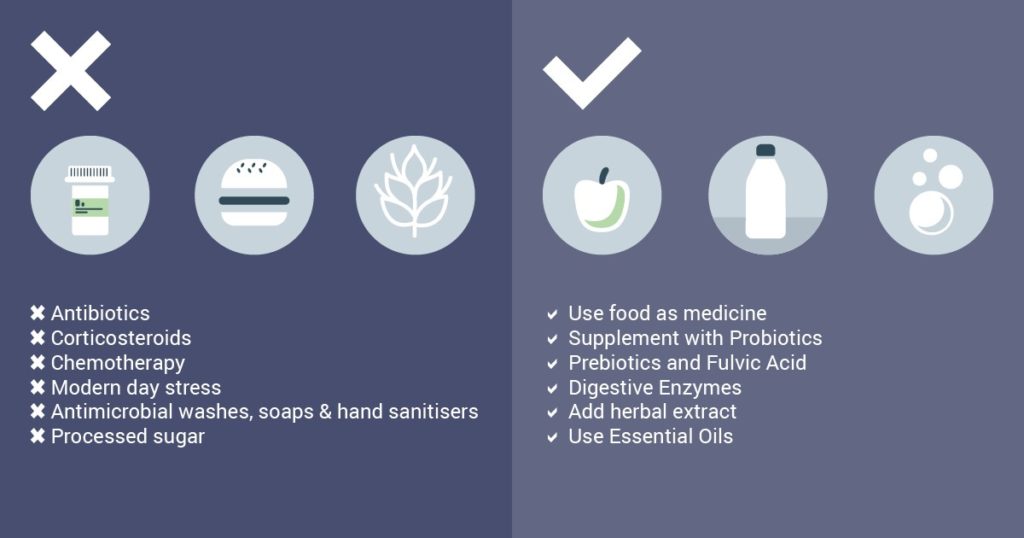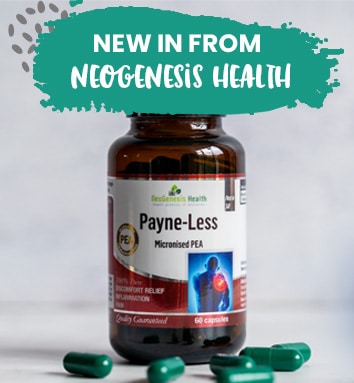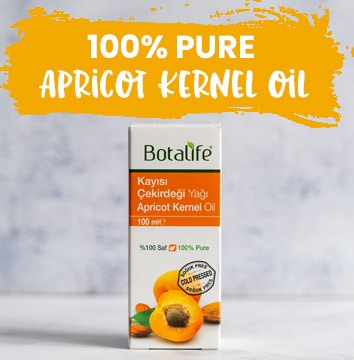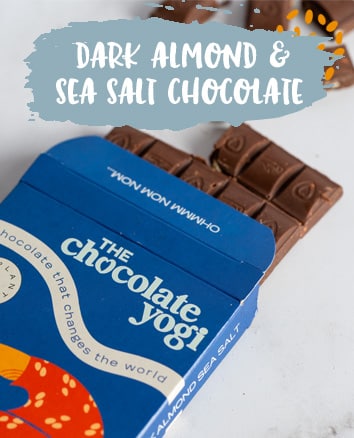Have you heard about the latest studies showing that we, humans, are host to between 10 and 100 trillion symbiotic microorganisms? Yes, it is true, science tells us that those microorganisms, which are mainly bacteria living in our gut, outnumber human cells 10 to 1 and bacterial DNA outnumbers human DNA 100 to 1. We are not entirely human, are we?
About half of our microbiome is inherited from our mothers and formed at childbirth and during breastfeeding. Throughout our lives, the microbiota is constantly changing and forming depending on what we eat, drink or are exposed to.
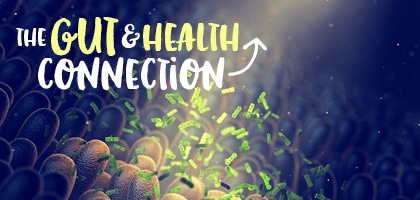
This universe of micro-organisms living inside of us is called a microbiome. According to Dr Josh Axe, “The human microbiome, or microbiota, is essentially the bacterial ecosystem living within our bodies, mostly within our guts.”
About half of our microbiome is inherited from our mothers and formed at childbirth and during breastfeeding. Throughout our lives, the microbiota is constantly changing and forming depending on what we eat, drink or are exposed to.
Functions of the gut
More than 400 different species of trillions of diverse bacteria inhabit our microbiota. Your gut, or microbiome, plays such a vital role in your body that it functions as an organ, just like your liver or pancreas does. It is responsible for so many important functions that it is no wonder it is often referred to as our second brain. These functions include:
1. Building up the majority of our immune system: Gut flora has direct interaction with our immune system cells by helping with the development and training of immune cells. Gut flora also serves as a physical barrier for antigens and pathogens by selectively regulating which particles pass through the intestinal lining into the body. The tiny “gates” on the lining of the digestive tract are designed to allow digested food to pass while keeping out larger food particles and other substances. When the digestive tract is compromised and the “gates” become damaged and enlarged, larger undigested food particles and unwanted substances will enter the body causing an immune response. Probiotics (beneficial bacteria) colonise the intestinal walls and reduce the ability for pathogenic life forms to grow.
2. Production of certain vitamins, like B7, biotin, B12, folic acid and vitamin K.
3. Synthesis of enzymes needed for various bodily functions.
4. Crucial for digestion and absorption of minerals and other nutrients, including vitamins, amino acids, fatty acids and antioxidants. One of the core functions the gut bacteria is to facilitate the synthesis of nutrients from your food. Balanced healthy gut flora will provide the best absorption of all essential nutrients from your diet and supplements. While compromised gut flora will lead to malnutrition and various health issues such as allergies, fibromyalgia, migraines, lack of energy and concentration, depression, etc.
5. Facilitating fermentation and digesting complex carbohydrates (dietary fibre)
6. Managing our appetite and body weight: Gut microbiota is responsible for how much energy (calories) are extracted from food and how much of it will be stored as fat.
7. Producing neurotransmitters, for example, hormones serotonin and dopamine which regulate mood and promote a sense of wellbeing and happiness.
8. Directly linked to brain and neurological functions
9. Gut bacteria maintain colon cleanliness by disposing of decaying and diseased cells.
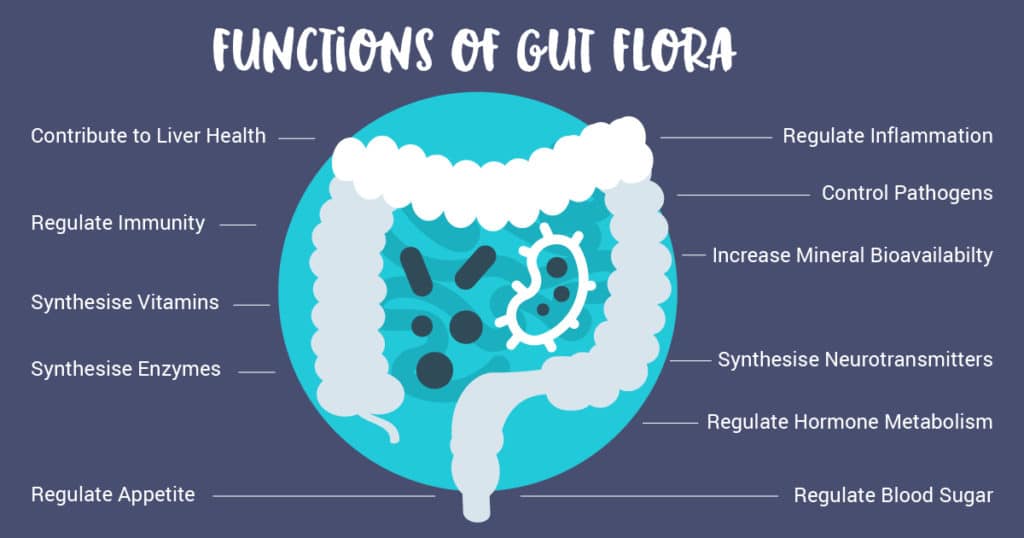
Gut and health issues:
“All diseases begin in the gut” – that’s what Hippocrates concluded about 2,500 years ago. Yet, it was not until very recently that modern science started to understand why this is true and officially acknowledged the connection between disease and a compromised gut and the importance of having healthy, balanced gut flora.
Gut and allergies
Allergies are our immune system’s reaction to an external (or internal) substance.
The gut microbiome plays an important role in how your immune system handles true threats like harmful bacteria or viruses – but we now know that a lack of enough beneficial bacteria or an overgrowth of harmful bacteria in the gut can contribute to the immune system’s inability to distinguish friend from foe, leading to the dreaded immune system overreactions known as allergies.
Recent scientific data has proven the direct correlation between the lack of particular strains of probiotic bacteria and allergic reactions such as food allergies or hay fever. Statistical data also shows that babies born by C-section are more likely to develop allergic reactions and asthma due to lack of probiotic strains acquired during normal vaginal birth.
Gut and autoimmune diseases
Since World War II and the advent of industrialisation, autoimmune diseases are on the rise. This upward trend is directly linked to changes in our diet and the frequent use of antibiotics, antacids and the introduction of thousands of chemicals into our food supplies and daily lives.
Studies show that patients with arthritis have increased intestinal permeability (leaky gut syndrome) and an overgrowth of pathogenic strains of bacteria. In fact, leaky gut syndrome is believed to be the underlying cause for most autoimmune diseases.
Gut and brain function
The gut is considered to be the “second brain”, as it has more neuron cells than the spinal cord.
Gut flora is also responsible for the production of neurotransmitter hormones like serotonin and dopamine, which induce a sense of wellbeing and happiness.
The gut can communicate with the brain and controls a large number of processes within its realm.
With that said, the next time you have a “gut feeling”, go with it.
Gut and cancer
Research about the connection between gut flora and cancer is ongoing. Studies have shown that patients with different types of cancer have overgrowths of pathogenic microorganisms. Medical science is still debating whether these overgrowths cause cancer or if they are as a result of cancer.
It is a well-established fact that chronic inflammation increases the risk of developing cancer. So the microbiota’s ability to raise or lower the level of inflammation in the gut and to train immune cells to be on the lookout for cancer is an important factor both for preventing and curing cancer.
Top 6 destroyers of gut flora
Our microbiome changes throughout our lives. Bacteria within us adapt and change depending on the food we eat, our sleeping habits, exposure to bacteria in daily life, stress levels, toxins in the environment etc.
Below are the top 6 causes for unhealthy gut flora:
1) Antibiotics:
Antibiotics help with serious health problems, but their biggest disadvantage is that they destroy all microbes, both beneficial and pathogenic. Having no gut flora leaves our immune system weakened and not be able to protect us.
Even people who have never had antibiotics are still accumulating antibiotic residue from meat and milk as non-organic industries use routine antibiotics on farm animals.
2) Corticosteroids
Corticosteroids are man-made hormones often prescribed for inflammatory bowel disease, lupus, MS, rheumatoid arthritis and other autoimmune diseases. They work by suppressing the immune system. Long-term use of steroids can actually weaken the gut barrier and result in changes to the microbiome that encourage pathogenic bacteria to flourish.
Other side effects of long-term use of corticosteroids include the depletion of important nutrients, such as vitamin B6 and C, and minerals vital for immune health –copper, magnesium, potassium, selenium and zinc; and impairedcalcium absorption and bone formation.
3) Chemotherapy
While chemotherapy is a conventional treatment for cancer, it can also negatively impact the digestive tract. Studies show that a profound disruption of the intestinal microbiome is observed after chemotherapy. Chemo treatments significantly affect the ability of the gut bacteria to produce vitamins, leads to various degrees of constipation or diarrhoea and impaired nutrient absorption.
4) Modern-day stress
Every-day stress is often determined as a cause for health problems. The chronic stress of running to be on time, dealing with a difficult boss or meeting project deadlines is a major disruptor of the gut microbiome. The body’s reaction to stressful situations includes releasingadrenaline and cortisol and restricting blood flow to the digestive tract. Ongoing restriction of blood leads to the reduction of microbial diversity and decreasing numbers of friendly flora, thereby creating conditions that encourage undesirable strains to thrive. Additionally, the immune system (most of which resides in the gut) doesn’t receive the influx of fresh blood it needs to function optimally.
Chronic stress also makes the digestive tract more permeable and alters some of its basic functions.
5) Antimicrobial washes, soaps and hand sanitisers
All antimicrobial agents are designed to kill most bacteria, without consideration which are beneficial and which are bad for our health. Our bodies need to be exposed to numerous strains of microbes in order to create optimum balanced microbiome. Trying to live in a hygienically clean environment limits this exposure and creates dysbiosis in our microbiome.
6) Processed sugar
Concentrated processed sugar kills beneficial bacteria (probiotics) while providing food for the pathogenic ones. Drinking coffee without sugar or not taking a slice of cake is not enough to avoid processed sugar. Modern diet includes processed sugars in many everyday food items such as bread, baked beans, sauces, cold drinks, cereals, baby foods etc.
How to keep the gut healthy naturally
Keeping your gut healthy need not be difficult. On the contrary, it can be delicious!
1. Use food as medicine
When it comes to repairing your gut, you will want to include foods that both nourish and heal your gut as often as possible. These include:
Bone broth is easy to digest, delicious and full of the nutrients essential to feeding and healing your gut;
Blueberries are high in antioxidants, anti-inflammatory and high in fibre, making it the perfect food to aid healthy digestion.
Orange Pumpkins are full of fibre, vitamin C, beta carotene and potassium, which are vital for smooth digestion and regular bowel movements and support a healthy immune system.
Papaya and Pineapples are a natural source of digestive enzymes andwill aid your digestion of protein.
Adding fermented or cultured food and drinks to your diet can greatly increase the biodiversity of your microbiome. Sauerkraut, fermented pickles, kimchi, kefir, kombucha and natural raw organic yoghurt are all foods naturally high in probiotics.
Healthy fats like grass-fed butter, coconut oil and extra-virgin olive oil will help you absorb fat-soluble vitamins and minerals. Coconut oil will help to kill bad bacteria and yeast, such as candida – which is normally out of control in a compromised gut. Omega-3 oils from plant sources or wild-caught fish are anti-inflammatory and highly beneficial for gut health.
Fibre-rich foods such as non-GMO, ancient grains and legumes/beans like adzuki beans, black beans, black-eyed peas, chickpeas, lentils, black rice, amaranth, buckwheat, quinoa.
2. Supplement with Probiotics, Prebiotics and Digestive Enzymes
Probiotic supplements provide selected human strains of beneficial bacteria that are well researched and essential for a healthy gut.
Prebiotics serve as food for probiotics and are essential in maintaining healthy colonies of good gut bacteria. Prebiotics in the form of supplements are necessary when your diet lacks fibre-rich foods or your digestive tract is already compromised.
Fulvic Acid feeds and nourishes our gut microflora,improves absorption of nutrients, removes toxins and waste from cells, provides powerful antioxidant protection and, being a very powerful natural electrolyte, it plays a key role in maintaining proper electrical balance within cells.
Digestive enzymes are naturally produced by your body. They start in your salivary glands and they break down food into a size absorbable by your intestines. Supplementing with digestive enzymes will give a much-needed break to the compromised or overworked digestive system and will help break down proteins that are hard to digest for some people. Pineapple and papaya are both fruits that are high in digestive enzymes and their active ingredients, bromelain and papain, are often included in many enzyme supplements.
3. Herbal extracts and essential oils can aid in repairing your gut naturally. Essential oils such as fennel and ginger will improve gut conditions. Be sure to add herbs and spices such as turmeric, ginger, basil, oregano, thyme and peppermint to your diet. You can find many gut health supplements and probiotics that already contain these herbs and oils.
